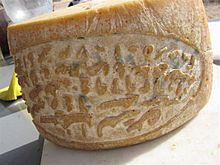Rumi cheese facts for kids
Quick facts for kids Rumi |
|
|---|---|
 |
|
| Country of origin | Egypt |
| Pasteurized | No |
| Texture | Hard/Crumbly |
| Weight | 10kg disks |
| Named after | Lua error in Module:Wikidata at line 70: attempt to index field 'wikibase' (a nil value). |
Rumi cheese (pronounced "ROO-mee") is a popular type of cheese from Egypt. It has a strong smell and a salty taste. The saltiness can be different depending on how old the cheese is. In some places, like Alexandria, people also call it gebna romi or gebna turki.
What is Rumi Cheese?
Rumi cheese is thought to come from a Greek cheese called kefalotyri. It is the main hard cheese made in Egypt. It is similar to other well-known hard cheeses like Pecorino Romano and Manchego.
How is Rumi Cheese Made?
Rumi cheese is usually made from cows' milk. Sometimes, it is made from a mix of cow and buffalo milk. No special starter culture is used to make it. The milk used is natural and has all its cream. Sometimes, peppercorns are added to the cheese.
Taste and Texture
After about 3 to 4 months, Rumi cheese gets a sharp, strong flavor. It also develops small holes, which gives it an "open" texture. You can find Rumi cheese in large disks that weigh about 10 kilograms (22 pounds). It is also sold in slices that are vacuum-packed. A small serving of Rumi cheese (about one ounce) has around 100 calories.
See also
 In Spanish: Queso rumi para niños
In Spanish: Queso rumi para niños
 | Jackie Robinson |
 | Jack Johnson |
 | Althea Gibson |
 | Arthur Ashe |
 | Muhammad Ali |

